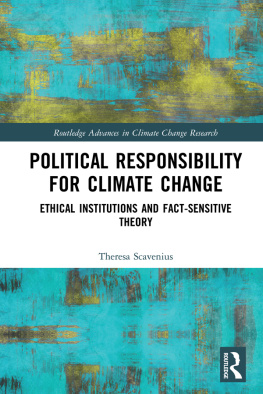INSTITUTIONS IN TURBULENT ENVIRONMENTS
For Allan Keating and Jack Darcy
Institutions in Turbulent Environments
A Study of the Impact of Environmental Change Upon Institutions for the Intellectually Disabled
T. P. Keating
Department of Social Work and Social Policy
School of Public Health
Faculty of Health Sciences
La Trobe University, Australia
First published 1999 by Ashgate Publishing
Reissued 2018 by Routledge
2 Park Square, Milton Park, Abingdon, Oxon, OX14 4RN
711 Third Avenue, New York, NY 10017, USA
Routledge is an imprint of the Taylor & Francis Group, an informa business
Copyright T. P. Keating 1999
All rights reserved. No part of this book may be reprinted or reproduced or utilised in any form or by any electronic, mechanical, or other means, now known or hereafter invented, including photocopying and recording, or in any information storage or retrieval system, without permission in writing from the publishers.
Notice:
Product or corporate names may be trademarks or registered trademarks, and are used only for identification and explanation without intent to infringe.
Publisher's Note
The publisher has gone to great lengths to ensure the quality of this reprint but points out that some imperfections in the original copies may be apparent.
Disclaimer
The publisher has made every effort to trace copyright holders and welcomes correspondence from those they have been unable to contact.
A Library of Congress record exists under LC control number: 99072336
ISBN 13: 978-1-138-31417-7 (hbk)
ISBN 13: 978-0-429-45717-3 (ebk)
| Figure AB.l Photo: Mayday Hills Hospital 1867 |
This work developed out of the task of redeveloping one of Victoria's oldest and largest institutions for the intellectually disabled in the period 1987-1993. The task was a pivotal one in the lives of a large number of very committed staff in the institution itself, and in the Department of Health and Community Services. I most gratefully acknowledge the achievements of these staff, and their contribution to the research.
My colleagues in the Department of Social Work and Social Policy, in particular Dr. Martin Ryan, and Mr. Bill Healy provided encouragement and guidance throughout the project. Gaye Neilson, Lisa Doige, Tammy Ebert and Linda Gordes provided invaluable assistance in the preparation of the manuscript.
The patience and support of Irene, Sam, Bridie, Eloise, Declan and Dominic Keating has been essential in sustaining me personally and this research project over five long years. They, as always have my warmest and most grateful affection.
Above all however, this study has been dependent upon Loretta, James, Verna, Jack and many others, for whom the story of Mayday Hills is their story. Their remarkable courage in facing the challenge of building a new life outside the institution provided much of the inspiration for this work. Their contribution to me personally and professionally is warmly acknowledged.
The financial support of the La Trobe University Publications Committee is gratefully acknowledged.
Tom Keating
A major focus of concern in the study of formal organisations has been with the way in which they change. A great volume of literature concerned with organisational theory and management has in recent years been devoted to the ubiquity of change within the experience of organisations, and with the accelerating pace of that change. On a global scale, the internationalisation of financial markets, ecological threats, rapid technological advancement, and changing perceptions as to the role and function of government have contributed in the later part of the twentieth century to a rapidly changing social and political environment. The formal organisations which populate that environment have faced significant adjustments in their markets, their resources and their legitimacy.
Social policy is concerned with the way in which publicly funded or mandated activity can or should respond to the social environment. As such it has been required to adapt and to change in response to changing attitudes to governmental action, the availability of resources, and to changes in practice technologies.
As social policies have adapted to new and emerging issues, and to changes within the social environment, those organisations which are governed by social policies have themselves had to change and adapt. One of the significant areas of social policy which has undergone dramatic change has been that concerned with the residential care of vulnerable people. These changes are most often referred to as "deinstitutionalisation".
Deinstitutionalisation has been a significant aspect of social policy as it affects a range of vulnerable client groups, in the period from the mid 1960s until the present time. As such, it has been one of the most significant organisational changes undertaken by public sector human services organisations in recent times. In the United States, Britain and Australia, governments have sought during this period to change the models of care for a range of vulnerable or statutorily detained groups in the community, from large scale and segregated congregate facilities to small group care within integrated settings.
The origins of the deinstitutionalisation focus of public policy may be seen in theoretical developments of the 1960s with respect to labelling theory, normalisation, and anti-psychiatry. They may arguably also be linked to the socio-political critiques of capitalist social control mechanisms by the New Left during the 1960s. Civil rights concerns and scepticism about the intentions of the state have been joined in more recent times as wellsprings of deinstitutionalisation by critiques of the Welfare State, and concern about the capacity of the State to fund one hundred per cent of the care of the vulnerable and the disadvantaged in institutional settings.
Deinstitutionalisation has not been without its critics. Questions have been raised as to the quality of the alternatives offered to those no longer having their needs met totally within statutorily controlled environments. There are concerns that the state is effectively transferring responsibility for care to households and communities ill equipped to provide that care. From a political economy perspective, there has been a view that far from disestablishing means of coercive social control, deinstitutionalisation has entailed an expansion of the intrusive and coercive powers of the state; a development of a new mechanism of control, while maintaining the old mechanisms (Cohen, 1985).
In the State of Victoria this direction in public policy may be seen in the redevelopment of the majority of congregate care facilities for children (orphanages and children's homes) between 1972 and 1989; the gradual reduction of psychiatric inpatient services and their replacement with community based service options; the decommissioning of Wilsmere Psychiatric Hospital (1989), St Nicholas Hospital for the Intellectually Disabled (1982), and the Caloola Training Centre for the Intellectually Disabled (1992). The policy directions which favoured alternatives to institutional care were established in legislation by the Community Welfare Services Act 1978 and subsequently the Children's and Young Persons' Act 1991 , the Mental Health Act 1986, and the Intellectually Disabled Persons Services Act 1986.








